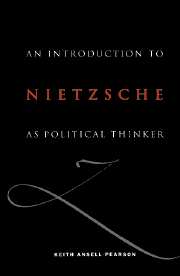Book contents
- Frontmatter
- Contents
- Acknowledgements
- Note on the texts and abbreviations
- Chronology of Nietzsche's life
- Introduction
- A note on Nietzsche and liberalism
- I THE QUESTION OF NIETZSCHE
- II ANCIENTS AND MODERNS
- III MAN AND OVERMAN
- 5 Zarathustra's teaching of the overman
- 6 A genealogy of morals
- 7 O humanity! Nietzsche on great politics
- IV THE QUESTION OF NIETZSCHE NOW
- Notes
- Bibliography
- Guide to further reading
- Index
6 - A genealogy of morals
Published online by Cambridge University Press: 10 November 2009
- Frontmatter
- Contents
- Acknowledgements
- Note on the texts and abbreviations
- Chronology of Nietzsche's life
- Introduction
- A note on Nietzsche and liberalism
- I THE QUESTION OF NIETZSCHE
- II ANCIENTS AND MODERNS
- III MAN AND OVERMAN
- 5 Zarathustra's teaching of the overman
- 6 A genealogy of morals
- 7 O humanity! Nietzsche on great politics
- IV THE QUESTION OF NIETZSCHE NOW
- Notes
- Bibliography
- Guide to further reading
- Index
Summary
All things that live long are gradually so saturated with reason that their origin in unreason becomes improbable. Does not almost every precise history of an origination impress our feelings as paradoxical and wantonly offensive? Does the good historian not, at bottom, constantly contradict?
Nietzsche, Daybreak, 1Morality as it has hitherto been understood – as it was ultimately formulated by Schopenhauer as ‘denial of the will of life’ – is the instinct of decadence itself … it is the judgement of the judged.
Nietzsche, Twilight of the Idols, ‘Morality as Anti-Nature’, 5INTRODUCTION TO A GENEALOGY OF MORALS
The Genealogy of Morals is a work of key importance for understanding Nietzsche's political thought. In this work Nietzsche rejects the approach of the natural law tradition of modern political thought (Hobbes, Locke, Rousseau, etc.), which seeks to establish the legitimacy of political rule by means of the notion of social contract. Nietzsche suspends questions of political obligation and legitimacy (why should the individual obey the state? What are the grounds of legitimate power?), in favour of a historical and psychological analysis of man's evolution as a moral animal. For Nietzsche, man is not naturally a political animal, but has undergone a process of training and cultivation through the evolution of morality and centuries of social development. The product of this process is the sovereign individual, the proud owner of conscience and a free will, who can be bound to social contracts and held responsible for his actions. The historical development of the animal ‘man’ has taken place in terms of a process of ‘moralisation’.
- Type
- Chapter
- Information
- An Introduction to Nietzsche as Political ThinkerThe Perfect Nihilist, pp. 121 - 146Publisher: Cambridge University PressPrint publication year: 1994
- 1
- Cited by



